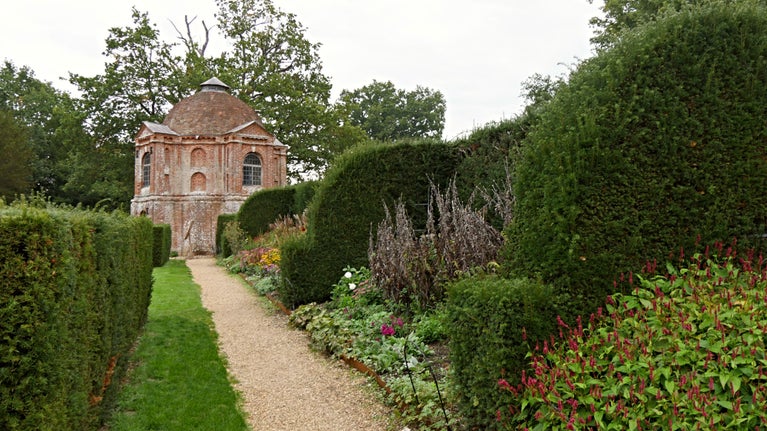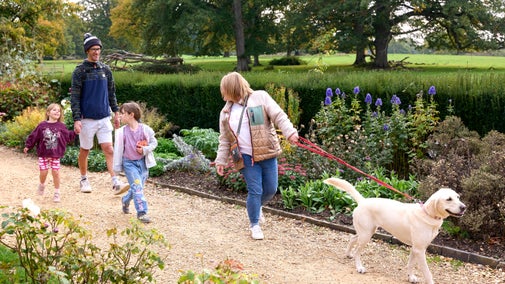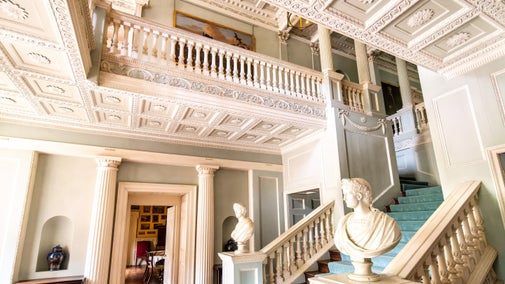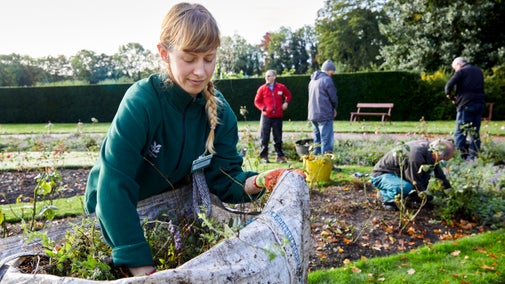
Discover more at The Vyne
Find out when The Vyne is open, how to get here, the things to see and do and more.

There are nine hectares of garden surrounding the house at The Vyne. Two lakes, a walled garden, formal garden and meadow along with lawns and a herbaceous border sit neatly inside this area. There is plenty for you to explore through the seasons, from the 17th-century summerhouse to a 600-year-old oak tree.
Hundreds of brightly coloured dahlias, swelling orange pumpkins, and a fruit orchard ready for harvesting are just some of the delights to look out for in the garden this season.
For a suggested donation, you can purchase a fresh bunch of dahlias grown in The Vyne's walled garden. Subject to availability.
Dating back to the 18th century, the walled garden houses a variety of fruit and vegetables as well as a dahlia border. An ambitious restoration programme restored the glasshouse and the fruit and vegetable beds to their former glory.
Possibly the earliest domed garden building in England, the summerhouse dates from around 1635 and has been used as a banqueting house and a dovecote. Designed by John Webb and built in the shape of a Greek cross, it is one of two originally built.
Today, the remaining summerhouse is the focus of the formal garden with beds which reflect the shape of the structure itself. The bedding plants are chosen to complement the shades of the summerhouse during the seasons and the garden is enclosed by a yew hedge.

Frail but still standing, the Hundred Guinea Oak is now over 600 years old. William John Chute, who owned The Vyne in the late Georgian period, was offered £100 and later 100 guineas for the timber.
He flatly refused to sell the oak, which you can see for yourself at the top of the Lime Avenue.
Here, the informal layout gives the impression of a natural landscape that has emerged all by itself. Laden with seasonal colour, trees gently arc over the main path at intervals while the paths mown through the long grass bring you to the lakeside where you can spot waterfowl gliding across the lake.
There are plenty of self-led trails around the estate for families to enjoy. Unfortunately ball games, frisbees, bikes, scooters and drones are not allowed on the estate. This is to prevent further damage to the house and grounds.

Find out when The Vyne is open, how to get here, the things to see and do and more.
Available to book for weekdays Mon 24 Nov – Wed 17 Dec 12pm-2pm. 2 courses, hot drink and mince pie £25 per person. 3 courses, hot drink and mince pie £30 per person. Click through to see menu and book. Normal admission applies.

The Vyne is a three pawprint rated place. Find out about bringing your dog to The Vyne where you can explore the gardens together.

From 11 Oct to 2 Nov, free trail ‘We’re Going on a Ghost Hunt’ Halloween Adventure offers family fun such as broomstick-racing and Halloween hoopla before collecting your sticker. Ideal for pre-schoolers and young children. From 22 Nov to 5 Jan (closed 24 & 25 Dec), free trail 'A Fairytale Christmas at The Vyne' showcases sparkling trees and magical scenes in the house. Youngsters will love the hilarious games and activities indoors and out. 𝐂𝐨𝐥𝐥𝐞𝐜𝐭 𝐲𝐨𝐮𝐫 𝐂𝐡𝐫𝐢𝐬𝐭𝐦𝐚𝐬 𝐡𝐨𝐮𝐬𝐞 𝐭𝐢𝐦𝐞𝐝 𝐭𝐢𝐜𝐤𝐞𝐭𝐬 𝐨𝐧 𝐚𝐫𝐫𝐢𝐯𝐚𝐥 𝐚𝐭 𝐕𝐢𝐬𝐢𝐭𝐨𝐫 𝐑𝐞𝐜𝐞𝐩𝐭𝐢𝐨𝐧. 𝐍𝐨 𝐩𝐫𝐞-𝐛𝐨𝐨𝐤𝐢𝐧𝐠, 𝐟𝐢𝐫𝐬𝐭-𝐜𝐨𝐦𝐞-𝐟𝐢𝐫𝐬𝐭-𝐬𝐞𝐫𝐯𝐞.

Open 22 Nov 2025 - 5 Jan 2026 inclusive (Closed 24 & 25 Dec) re-live the magic of best-loved fairy tales. In the house discover The Snow Queen’s icy realm, Red Riding Hood’s cunning wolf, and Beauty and the Beast’s elegant tea set. House open 11am-3pm, gardens 10am-4pm. 𝐂𝐨𝐥𝐥𝐞𝐜𝐭 𝐲𝐨𝐮𝐫 𝐡𝐨𝐮𝐬𝐞 𝐭𝐢𝐦𝐞𝐝 𝐭𝐢𝐜𝐤𝐞𝐭𝐬 𝐨𝐧 𝐚𝐫𝐫𝐢𝐯𝐚𝐥 𝐚𝐭 𝐕𝐢𝐬𝐢𝐭𝐨𝐫 𝐑𝐞𝐜𝐞𝐩𝐭𝐢𝐨𝐧. 𝐍𝐨 𝐩𝐫𝐞-𝐛𝐨𝐨𝐤𝐢𝐧𝐠, 𝐟𝐢𝐫𝐬𝐭-𝐜𝐨𝐦𝐞-𝐟𝐢𝐫𝐬𝐭-𝐬𝐞𝐫𝐯𝐞. New for 2025, book your Christmas lunch in the Brewhouse tea-room available on weekdays 24 Nov - 17 Dec at 12pm. Scroll down and click through for the Christmas Lunch Menu and to book your Christmas Lunch.

Enjoy a refreshment stop in the atmospheric tea-room at The Vyne, Christmas Lunch 2025 bookings are now open. Treat yourself to a gift in the shop or get comfy in the window seat while browsing pre-loved books.

The Sandys and Chute families made The Vyne their home for over 500 years. They accumulated beautiful and important objects and made significant changes to the house during their lives, which you will see as you explore the opulent state rooms and humble servants’ quarters. Celebrating 250 years of Austen, enjoy exhibition 'Regency Revisited' and biweekly 'Jane Austen House Tours' for an additional £5 per person. The annual deep clean is currently underway, so now's the perfect time for a 'behind-the-scenes' style visit to the house. From 22 November, immersed in the magic of best-loved fairy tales, wander the ground floor of the house aglow with sparkling Christmas trees. Read on for more information.

Discover our gardeners’ top tips so you can make the most of your garden, plot or window box.
